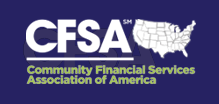Bureau’s Small-Dollar Loan Rule Already Causing Irreparable Harm to Businesses in Advance of 2019
September 17, 2018 | Press Releases
ALEXANDRIA, VA – Small businesses are already incurring enormous financial costs and laying off employees to comply with the Bureau of Consumer Financial Protection’s (Bureau) small-dollar loan rule and some are already scaling back operations, according to a motion for preliminary injunction filed today by the Community Financial Services Association of America (CFSA) and the Consumer Service Alliance of Texas (CSAT). The motion also details the “massive irreparable financial losses” that small-dollar lenders will incur if the Bureau’s rule continues as written and seeks to halt the rule to protect small businesses from incurring more costs, laying off employees and shuttering stores for a rule that may never go into effect, given the Bureau’s pending reconsideration of the rule.
The motion states, small businesses “do not expect to survive under the Rule” and “are already experiencing store closings, business disruptions, and resultant lost revenues.” Additionally, the motion adds, larger businesses “who expect to continue to operate under the Rule—likewise have already suffered and will continue to suffer irreparable injury. For instance, one large national lender has already spent more than $4 million dollars, and will spend $9 million more—two thirds of that in the final quarter of 2018—in order to implement costly company-wide changes to its information-technology systems, business practices and policies, and employee training.”
“Businesses, their employees and communities across the country are already facing the harmful consequences of the Bureau’s misguided rule,” said Dennis Shaul, CEO of CFSA. “Worse, once fully implemented, the rule would virtually eliminate small-dollar, short-term loans, kill hundreds of small businesses, eliminate thousands of jobs and deny access to credit for millions of Americans.”
Several CFSA members filed declarations in support for the motion for preliminary injunction, detailing the operational burdens and disruptive upheaval they are already facing many months before the compliance deadline of the rule in August 2019.
CFSA member company Cash Fast, based in South Carolina, is already feeling the adverse effects of the Bureau’s rule, having been forced to close one of its locations and lay off the employees that worked there. Cash Fast further projects that it will have to close some or all remaining locations before August 2019 if the rule continues as written.
Even before the 2019 compliance date, the Cash Fast owner must decide by November 2018 whether to sell one location, which “would cost the jobs of three full-time employees and one part-time employee, and would cost Cash Fast approximately $220,000 in annual income.” While the owner does not wish to sell, he feels he has little choice if the rule continues as written. More than 1,500 people every month rely on Cash Fast for their short-term credit needs.
If the rule goes into effect, the impact on other small businesses will be even more dire. According to the Bureau’s own estimates, the rule’s onerous requirements will reduce the total volume of storefront small-dollar loans by approximately 92 to 93 percent. CFSA member Cash In A Dash asserts that it “will not be able to operate profitably and will have to close its doors if the rule goes into effect. As a result, Cash In A Dash’s six current employees (many who have been with the company for more than a decade) will lose their jobs, its customers will lose a valuable source of consumer financing, and its landlords and vendors will lose significant revenues.”
In addition to protecting small-dollar loan businesses from financial costs and operational burdens they already are incurring, a preliminary injunction also favors consumers and the Bureau. The motion concludes that an injunction “will ensure that the Bureau has sufficient time to conduct a thorough and careful reassessment of the rule” and “ensure that borrowers whom the rule would otherwise deprive of needed sources of credit will continue to have access to payday loans until the rule’s legality is resolved.”
The motion also alleges the injunction is warranted considering the plaintiffs are substantially likely to succeed on the merits of the law because the Final Rule is unconstitutional, exceeds the Bureau’s statutory authority, and is the result of arbitrary and capricious decision-making.
BACKGROUND
CFSA filed its lawsuit on April 9, 2018, alleging that the Bureau rule exceeds the Bureau’s statutory authority and is arbitrary, capricious, and unsupported by substantial evidence in violation of the Administrative Procedure Act (APA). The lawsuit also argues that the Bureau’s structure is unconstitutional under the Constitution’s separation of powers because the agency’s powers are concentrated in a single, unchecked Director who is improperly insulated from both presidential supervision and congressional appropriation, and hence unaccountable to the American people.
Small-dollar loans provide a financial lifeline for millions of consumers to weather unexpected financial hardships, with approximately twelve million Americans per year relying on small-dollar loans. During the CFPB’s public comment period, more than one million customers voiced their opposition to the rule through submissions that included hundreds of thousands of handwritten comments. In addition to consumer opposition, the Small Business Administration’s Office of Advocacy expressed concerns about the rule’s harmful impact on small businesses nationwide. Despite the overwhelming opposition, the Bureau finalized the rule on October 5, 2017, without taking these concerns into account.
The defendants in the lawsuit are the Consumer Financial Protection Bureau and Acting Director CFPB Mick Mulvaney. The initial complaint can be found here. The case is pending in the U.S. District Court for the Western District of Texas, Austin Division.
###
About the Community Financial Services Association of America
The Community Financial Services Association of America (CFSA) is the only national organization dedicated solely to promoting responsible regulation of short-term credit products and consumer protections through CFSA’s Best Practices. As such, we are committed to working with policymakers, consumer advocates, and CFSA member companies to ensure that short-term credit is a safe and viable option for consumers.
Media Contact: (E) newsroom@cfsaa.com, (P) (888) 572-9329

